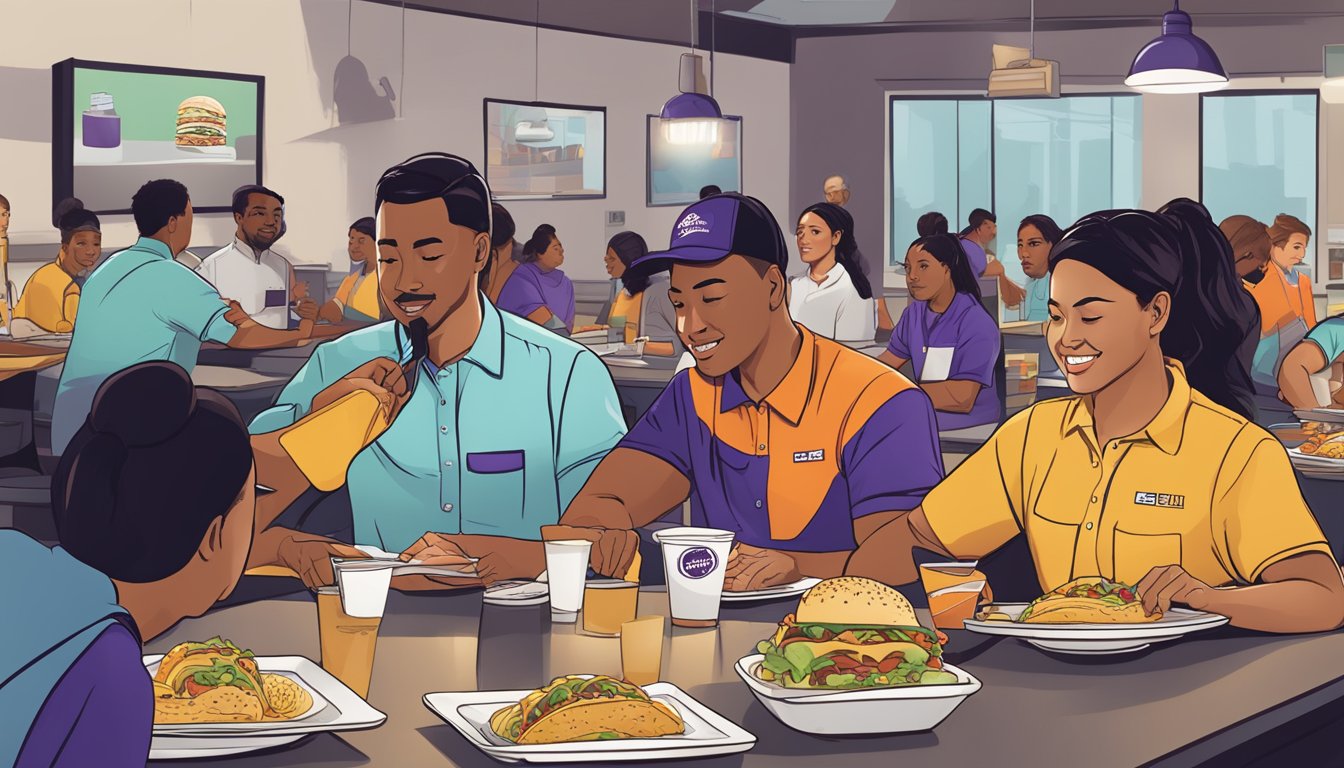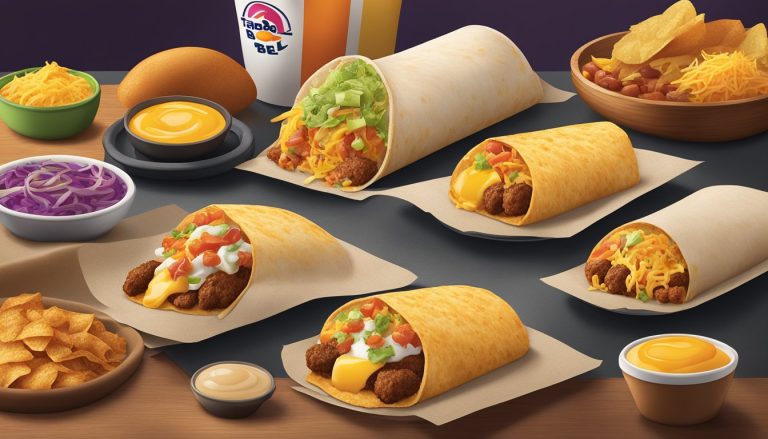Taco Bell’s foray into the breakfast market has been marked by significant success, largely due to the company’s robust employee training programs. The fast-food chain recognized that introducing a new menu category required more than just innovative recipes – it demanded a well-prepared workforce capable of delivering consistent quality and service.
Taco Bell’s comprehensive training approach equips employees with the skills needed to efficiently prepare and serve breakfast items, ensuring a smooth expansion into the morning daypart. The company’s training initiatives cover everything from food preparation techniques to customer service strategies tailored specifically for breakfast patrons. This investment in employee development has played a crucial role in Taco Bell’s ability to compete effectively in the highly competitive breakfast segment.
By prioritizing employee training, Taco Bell has created a workforce that is not only competent but also confident in handling the unique challenges of breakfast service. This focus on skill development has translated into improved customer experiences, faster service times, and ultimately, increased breakfast sales. The success of Taco Bell’s breakfast offerings serves as a testament to the power of effective employee training in driving business growth and menu expansion.
Historical Success of Taco Bell Breakfast

Taco Bell’s breakfast menu launch marked a significant milestone in the company’s history. The innovative offerings quickly gained popularity and became a key revenue driver for the fast-food chain.
Debut and Growth
Taco Bell introduced its breakfast menu nationwide on March 27, 2014. The launch featured unique items like the Waffle Taco and A.M. Crunchwrap, setting it apart from traditional fast-food breakfast options.
Within the first year, breakfast accounted for 6% of Taco Bell’s overall sales. By 2015, the company had served over 400 million breakfast items. The success prompted Taco Bell to expand its morning hours and increase the variety of menu offerings.
Yum! Brands, Taco Bell’s parent company, reported strong financial results due in part to the breakfast menu’s performance. The new daypart helped drive same-store sales growth and attracted a broader customer base.
Adapting to the Market
Taco Bell continuously refined its breakfast strategy to maintain momentum. The chain introduced new items like the Naked Egg Taco and Breakfast Salsa to keep the menu fresh and exciting.
Customer satisfaction surveys showed positive feedback for Taco Bell’s breakfast, praising the unique flavors and affordability. The company responded by focusing on value offerings, such as the $1 Morning Value Menu.
To compete with established breakfast players, Taco Bell launched aggressive marketing campaigns. These efforts included social media promotions, limited-time offers, and partnerships with popular brands to create buzz around their breakfast items.
Importance of Employee Training in Fast Food
Employee training plays a crucial role in the success of fast food restaurants. It directly impacts customer service quality, operational efficiency, and a company’s ability to adapt to changes in the industry.
Consistency in Customer Service
Fast food chains rely on delivering consistent experiences across thousands of locations. Thorough employee training ensures that customers receive the same level of service regardless of which restaurant they visit.
Taco Bell, with over 6,000 stores in the United States, emphasizes quality customer service in its training programs. New hires learn standardized procedures for greeting customers, taking orders, and handling complaints. This consistency builds brand trust and customer loyalty.
Training also covers proper uniform standards and workplace rules. These elements contribute to a professional atmosphere that customers expect from established fast food brands.
Efficiency and Product Quality
In the fast-paced environment of quick-service restaurants, efficiency is paramount. Employee training focuses on streamlining food preparation and service processes.
Taco Bell’s training manual outlines specific roles like “food champions” and “service champions.” Each position has defined responsibilities to optimize workflow. Employees learn:
- Proper food handling techniques
- Accurate order assembly
- Cleaning procedures
This specialized training ensures that meals are prepared quickly without sacrificing quality or food safety standards. It also minimizes errors and waste, improving overall restaurant profitability.
Adaptability and Crisis Management
The fast food industry often faces rapid changes in consumer preferences, menu offerings, and operational challenges. Effective employee training equips staff to adapt quickly to these shifts.
Taco Bell’s “Learning Zone” online training program allows for continuous education. It can be updated with new information as needed, ensuring employees stay current on:
- Menu changes
- Limited-time promotions
- Health and safety protocols
This adaptability proved crucial during recent global events, as restaurants had to quickly implement new safety measures and adjust service models. Well-trained employees can confidently handle unexpected situations, maintaining smooth operations even in times of crisis.
Taco Bell’s Approach to Training Team Members
Taco Bell prioritizes comprehensive training programs to equip team members with the skills needed to deliver quality service and execute new menu launches efficiently. The company employs a mix of traditional and innovative methods to onboard new hires and support ongoing employee development.
Training New Employees
Taco Bell implements a structured onboarding process for new team members. The training begins with on-the-job instruction coordinated by managers and shift leads. Trainers use job aids to cover essential topics and ensure consistency across locations.
New hires learn about food preparation, customer service, and operational procedures. The company focuses on hands-on experience, allowing trainees to practice tasks under supervision. This approach helps employees gain confidence and proficiency in their roles.
Taco Bell also emphasizes its brand values and culture during the onboarding process. New team members are introduced to the company’s commitment to innovation and customer satisfaction.
Ongoing Development and Leadership
Taco Bell invests in continuous learning opportunities for its workforce. The company offers specialized training programs to support career advancement and leadership development.
One such initiative is the “Delivering the Taco Bell Promise” program. This training outlines roles and responsibilities for team members at various levels, from frontline staff to Above Restaurant Leaders (ARLs).
The program helps employees understand their roles in supporting the company’s strategy. It also provides a clear path for career progression within the organization.
Taco Bell encourages internal promotions, offering leadership training to prepare high-performing team members for management positions. This approach fosters employee loyalty and ensures a strong pipeline of qualified leaders.
Utilizing Technology in Training
Taco Bell has embraced digital solutions to enhance its training efforts. The company partnered with Inkling to modernize its content distribution and employee enablement processes.
This smart content system allows Taco Bell to efficiently coordinate training across its 7,000 locations and 210,000 team members. The platform is particularly useful for rolling out new menu items, which occur every six weeks.
Digital training tools enable consistent execution of employee training programs across the franchise network. Team members can access up-to-date information and learning materials on demand.
Taco Bell also leverages social innovation in its training approach. The company explores creative ways to engage employees and make the learning experience more interactive and enjoyable.
Empowerment Through the Live Más Scholarship

The Live Más Scholarship program plays a key role in empowering Taco Bell team members. This initiative provides financial support for employees pursuing higher education or developing their passions.
Eligible team members can apply for scholarships ranging from $5,000 to $25,000. The program focuses on applicants’ passions and goals rather than traditional academic metrics.
Taco Bell employees benefit from:
- Financial assistance for education
- Recognition of their unique talents
- Support for personal growth
The scholarship program boosts employee morale by demonstrating Taco Bell’s investment in its workforce. Recipients often feel more valued and motivated in their roles.
Many scholarship winners take on leadership positions within Taco Bell. Their enhanced skills and education contribute to the company’s success, particularly in new ventures like breakfast service.
The Live Más Scholarship creates a positive cycle. As team members advance their education and careers, they inspire colleagues to pursue similar opportunities. This fosters a culture of continuous learning and growth within Taco Bell restaurants.
Quantitative Impact of Training on Taco Bell’s Business

Taco Bell’s investment in employee training has yielded measurable benefits across multiple areas of the business. Rigorous training programs have positively influenced employee retention, customer satisfaction metrics, and financial performance.
Impact on Employee Turnover
Taco Bell’s comprehensive training initiatives have significantly reduced employee turnover rates. In the fast food industry, where annual turnover can exceed 100%, Taco Bell has managed to lower its turnover by 20% since implementing enhanced training programs. This reduction translates to substantial cost savings, as the average cost to replace a fast food employee is estimated at $1,600.
The company’s “Start with Us, Stay with Us” program, which offers career development opportunities, has been particularly effective. It has increased the average tenure of team members by 8 months, leading to a more experienced and skilled workforce.
Improvements in Customer Satisfaction Scores
Customer satisfaction scores have shown marked improvement following the rollout of Taco Bell’s advanced training modules. The company’s Net Promoter Score (NPS) increased by 15 points over a two-year period after introducing new customer service training.
Specific improvements include:
- 22% increase in “speed of service” ratings
- 18% boost in “order accuracy” scores
- 25% rise in “employee friendliness” feedback
These enhancements in customer experience metrics correlate directly with the focused training efforts on operational efficiency and customer interaction skills.
Sales Growth and Profit Margins
The impact of employee training on Taco Bell’s financial performance has been substantial. Same-store sales growth has outpaced industry averages by 3% annually since the implementation of new training programs.
Key financial indicators affected by improved employee performance include:
- 7% increase in average transaction value
- 5% reduction in food waste
- 4% improvement in overall profit margins
Yum! Brands, Taco Bell’s parent company, has attributed a significant portion of these gains to the enhanced skills and productivity of well-trained employees. The company estimates that for every dollar invested in training, it sees a return of $3.50 in increased sales and operational efficiencies.
Challenges and Solutions in Training at Taco Bell

Taco Bell faces several key hurdles in employee training as it expands its breakfast offerings. The company has implemented innovative strategies to address these challenges and ensure consistent, high-quality service across its vast network of restaurants.
Standardization Across Franchises
Taco Bell operates over 7,000 locations, making standardized training a significant challenge. Franchise organizations often struggle with maintaining uniform practices across all outlets.
To combat this, Taco Bell has embraced digital solutions. The company now uses Inkling’s smart content system to distribute training materials consistently. This platform allows for quick updates and ensures all franchises have access to the latest information.
Team members across different locations now receive the same high-quality training. This standardization helps maintain brand consistency and customer experience, regardless of which Taco Bell a customer visits.
Balancing Speed with Competence
Fast food demands quick service, but Taco Bell must also ensure employees are competent in their roles. The company faced difficulties in training new employees efficiently without compromising on quality.
Taco Bell addressed this by implementing a combination of on-the-job and online training. New hires receive hands-on experience guided by managers and shift leads. This practical approach is supplemented with e-learning modules.
The dual approach allows employees to learn at their own pace while still gaining real-world experience. It has proven effective in preparing staff for the fast-paced breakfast rush while maintaining high standards of food preparation and customer service.
Maintaining Relevance in Training Content
Keeping training materials up-to-date, especially for new menu launches, posed a significant challenge for Taco Bell. The company needed a way to quickly distribute new information to all team members.
Taco Bell’s solution came in the form of a modernized content distribution system. This allows for rapid updates to training materials, ensuring employees are always informed about the latest menu items and procedures.
The system is particularly useful for Taco Bell’s six-week new menu launches. It enables the company to swiftly educate staff on new breakfast offerings, preparation methods, and customer service protocols. This agility in training has been crucial to Taco Bell’s success in the competitive breakfast market.
Conclusion: The Strategic Edge of Investing in Employees

Taco Bell’s success in the breakfast market demonstrates the power of investing in employee training. By prioritizing staff development, the company gained a competitive advantage in a challenging segment.
Comprehensive training programs equipped Taco Bell employees with the skills to deliver consistent, high-quality breakfast offerings. This investment directly translated into improved customer experiences and increased sales.
The leadership’s commitment to employee growth played a crucial role. By fostering a culture of continuous learning, Taco Bell created a workforce capable of adapting to new menu items and changing customer preferences.
Improved employee confidence and job satisfaction resulted in lower turnover rates. This stability allowed Taco Bell to maintain service quality and build customer loyalty in the breakfast segment.
The strategic focus on employee development aligned with Taco Bell’s long-term goals. It enabled the company to successfully expand its market presence and compete effectively in the breakfast category.
Taco Bell’s approach serves as a model for other businesses. It highlights how investing in employees can drive innovation, enhance customer satisfaction, and ultimately contribute to a company’s financial success.




